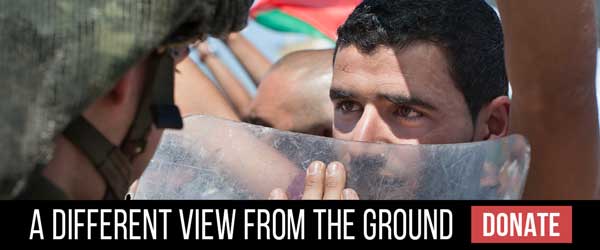Nearly 20 years after it banned torture, Israel’s High Court is finding new ways to justify using physical force in the interrogation of security suspects.

Israel’s High Court of Justice last week ruled that Israeli authorities’ torture of a Hamas suspect was not illegal and that the Shin Bet interrogators do not need to be prosecuted. The ruling also broadened and effectively removed the strict limitations imposed by a landmark decision by the same court nearly two decades ago, which carved out a “ticking bomb” exception to the prohibition on torture.
“The ruling shows that in the eyes of the High Court, physical abuse is a legitimate and perhaps even the preferable way of carrying out an interrogation in cases of national security,” said Itamar Mann, a law lecturer at Haifa University.
Shin Bet agents have for decades used torture, including moderate and severe physical and psychological abuse, to extract information from Palestinian suspects. The methods have ranged from violent shaking, beatings, sleep deprivation, long exposure to loud music, exposure to the elements, restraining suspects in painful positions for long periods, and covering suspects’ heads in foul-smelling sacks.
Israel ratified the UN Convention Against Torture in 1986, but never took the next step of actually outlawing the practice in Israeli law.
In September 1999, however, the High Court unanimously banned the use of physically abusive interrogation tactics. The ruling was widely viewed as a bold prohibition on torture and has been lauded and taught around the world. But in their historic decision, the justices also created a significant loop-hole to the prohibition: in the case of a “ticking bomb,” interrogators could avoid prosecution by invoking a necessity defense.
Twenty years later, it is clear just how much the Shin Bet has stretched that loophole. “The ruling could be seen an attempt to hide what the Shin Bet is actually doing,” added Mann.
Since 2001, when the Justice Ministry appointed a special investigator of torture allegations against the Shin Bet, PCATI and other organizations submitted over 1,100 complaints of torture. Of those, only one resulted in a criminal investigation, and it was not directly related to an interrogation.
The ruling also expanded the situations and circumstances in which the Shin Bet can use torture.
“The decision allows for the forced interrogation of any person who is tied to an armed wing of a terrorist organization, who has information about an attack that could take place at any given time, and is not willing to give up that information,” Mann said. “This is different from a ticking bomb scenario, thus casting a wide net that covers nearly every person who Israel deems an enemy combatant.”
The plaintiff in last week’s case, Fares Tbeish, a Hamas member, had hoped the court would order the Justice Ministry to reverse its decision not to open a criminal investigation into his interrogators, who he says tortured him.
Tbeish, who is being represented by PCATI and was first arrested and put in administrative detention in 2011, says the tactics Shin Bet interrogators used against him included beatings, violent shaking, humiliation, tying him to a chair in painful positions, and repeatedly moving him from one interrogation facility to another. He was later tried in court and sentenced to three years in prison.
Tbeish allegedly admitted that he had received weapons from a high-ranking Hamas member, which he then transferred over to a secret cache, but it was never established whether Tbeish knew if those weapons would be used in an imminent attack.
As a result of the interrogations, Tbeish said he had suffered bruising to his leg and eye, as well as a broken tooth. Efrat Bergman-Sapir, who heads the legal department at the Public Committee Against Torture in Israel and argued the case, says that the use of torture was enough to merit opening a criminal investigation against the defendant’s interrogators, and that the lack of a ticking bomb scenario meant they should not be able to invoke a necessity defense.
In addition to asking the court to prosecute the offending Shin Bet interrogator, Tbeish and PCATI also wanted the court to close the loophole that allows for the use of torture in the first place. The very existence of internal Shin Bet guidelines — regarding the proper ways to extract information from suspects as well as how and when to invoke a necessity defense — actually lay the groundwork for using torture.
The convention on torture defines the practice as “any act by which severe pain or suffering, whether physical or mental, is intentionally inflicted on a person.” In their ruling last week, the justices concluded that the tactics employed against Tbeish did not meet that definition, but were “proportionate and reasonable in relation to the danger that arose from the intelligence.”
“The court’s decision may be interpreted as a significant withdrawal from the moral and legal position established in the landmark decision on torture in 1999,” Bergman-Sapir said in a written statement. “Equally troubling is the impossible threshold set by the court against the complainant to prove that he was tortured in the interrogation room and experienced severe pain and suffering.”
The High Court had the opportunity to restate that torture, or any violation of international law, is unlawful, said attorney Bana Shoughry, who headed PCATI’s legal department between 2008 and 2015 and was involved in Tbeish’s case early on. Instead, it expanded the possible exemptions for Shin Bet interrogators who break the law, not just from prosecution, but even from an investigation. “The decision puts an end to the idea that Shin Bet interrogators will be held accountable for their actions.”
The Shin Bet has primarily used torture against Palestinians suspected of involvement in armed resistance or terrorism. “These kinds of rulings make it easier for the Shin Bet to use these practices against additional groups,” Mann concluded. “They have already been used against radical settlers, and will likely continue to permeate other parts of the legal system, beyond what we can imagine.”


